The Parrot Who Extinguished a Forest Fire
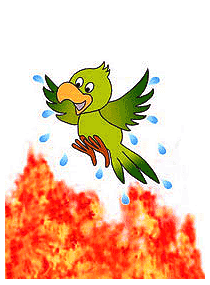 The Buddha was teaching in a village and told the following story. Once a bamboo forest was on fire, and it spread quickly due to the strong and dry wind. The flames swallowed up everywhere in the mountain jungle, and was about to swipe away all lives there. A parrot named “Joyful Head” was disheartened to see all the living beings having no way to escape. The Buddha was teaching in a village and told the following story. Once a bamboo forest was on fire, and it spread quickly due to the strong and dry wind. The flames swallowed up everywhere in the mountain jungle, and was about to swipe away all lives there. A parrot named “Joyful Head” was disheartened to see all the living beings having no way to escape.
So Joyful Head flew to the sea nearby, wet its small wings with the seawater, and flew back to spray the water drops over the flames. It flew back and forth endlessly, despite becoming very weak from the effort. Its determination and sincere, chivalrous act moved the heavenly king Indra.
“Joyful Head, with your tiny body, tell me how are you going to put out this wide and forceful fire?” asked the heavenly king. “My intention is even broader than the fire! If I am not able to extinguish the fire in this life, I vow to continue and put it out in my next life!” replied the parrot.
Indra was so moved by the parrot that he manifested his miraculous power to create a great rain and poured over the forest. Soon, all beings were saved.
The Buddha said, “this parrot was my past life, indeed, and all the birds and beasts in the jungle were none other than the villagers. The former me had rescued them by putting out a fire. In this life, I will extinguish all fires of anger, greed, and ignorance, in order to save them from suffering and attain peace. In their previous lives, the villagers had the remarkable opportunity to take the Five Precepts, therefore, they were able to understand the truth thoroughly today, and attained the sagely state of first fruit.
Reflection
Each of us has an ideal vision of how success can be reached. But success cannot be reached with any ideal short-cuts. Success is the result of the accumulation of each single step we take towards our goal. “There is no such thing as an impossible task. There is only the lack of determination and efforts.” Possibility is a function of our own hard work and perseverance.(TOP)
|
The Well Under the Tree
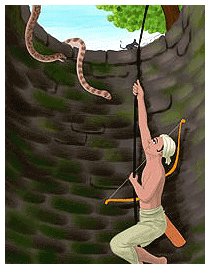 One day, the Buddha shared a story with his disciples, with the hope that they could often contemplate on its meaning. One day, the Buddha shared a story with his disciples, with the hope that they could often contemplate on its meaning.
A long time ago, there lived a hunter. While one day walking in the great open grasslands, this hunter suddenly became the object of an elephant's frantic charge. The panic stricken hunter, running for his life, suddenly spotted an abandoned and dried up well. Next to the well there was a big tree, and hanging from the tree were its aerial roots. Seeing this, the hunter rushed over, grabbed one of them and proceeded to lower himself into the well, hoping to escape from the crazed elephant's pursuit.
At this moment, suspended in mid air within the well, the hunter suddenly realized that his life was actually now in even greater peril. Above him, he saw two mice, one black and one white, gnawing at the root from which he was hanging. The root could snap at any moment. Next, he spotted four poisonous snakes encircling the well, just waiting for the right moment to pounce on him. As if that weren't enough, at the bottom of the well lay a poisonous dragon just waiting for the hunter to fall, so that he could devour him.
For the sake of his life, the hunter held on to the root with all his might. Unawares to the hunter, due to the swaying of the root, a beehive perched above the well released five drops of sweet honey, which landed on the corner of the hunter's mouth. He licked it. The honey was pure and sweet. The hunter craved for more. Not only did he completely forget about his current predicament, but he even went to the point of energetically swinging himself back and forth, with the hope that more honey would fall. This, however, only managed to startle the bees, sending them out of their hive to attack the hunter. In addition to these dangers, the vast, expansive grasslands suddenly caught on fire, sending a great wall of flames racing towards this tree from which he hung.
The Buddha then spoke to everyone in attendance, “In this story, these great plains are a metaphor for this period of ignorance that man has been residing in since ancient kalpas. The hunter represents all sentient beings, while the elephant stands for impermanence. The well is a metaphor for life and death, and the root represents the frailty of life. Furthermore, the black and white mice symbolize day and night, and the chewing on the rope represents the arising and ceasing of all thoughts. The four poisonous snakes stand for the four elements of the body: earth, water, fire, and wind. The five drops of honey symbolize the five desires: wealth, lust, fame, food, and sleep. The bees are a metaphor for wrong views, the fire on the grasslands symbolizes old age and sickness, and the poisonous dragon represents death.” The Buddha then cautioned all present on the importance of thoroughly understanding the dreadfulness of old age, sickness, death and impermanence, and that one should not be indolent or indulgent, continuing to allow oneself to be enslaved by the five desires. The Buddha then spoke a stanza for those present, the meaning of which is as follows:
When the wise ones see the great force and the dreadful nature of impermanence: old age, sickness, and death, they will become wearied of the five desires. The minds of sentient beings are sunk in the great sea of ignorance and cling to the five desires; therefore they are always helpless in the face of death and rebirth. If one can stop craving and clinging to external sounds, forms, and other phenomena, one can then break free from the shackles of death and rebirth and be liberated.
After hearing the Buddha’s words, all those in attendance experienced incomparable joy, and happily accepted and put the teachings into practice.
Reflection
Because of our greed for the five desires, we have for continuous kalpas been transmigrating in the cycle of death and rebirth, and suffering the painful consequences in vain. The Sutra on Impermanence says, “The suffering of aging, illness, and death constantly afflicts all sentient beings.” Therefore, sentient beings should keep impermanence in mind, diligently cultivate the Way, practice good deeds, and eliminate evil. One will then be able to cross the bitter sea of death and rebirth and reach the other shore of liberation and enlightenment. (TOP) |
The Danger of Indolence
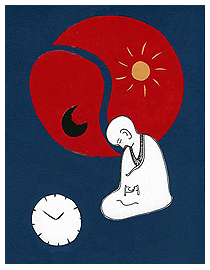 As a matter of importance, the Buddha often exhorted the monks to dedicate themselves fully to their discipline. Nothing is permanent; everything is transitory. And if one is able to transform the confusions blocking one from enlightenment, then one can escape the cycle of death and rebirth, and attain ultimate peace and joy. As a matter of importance, the Buddha often exhorted the monks to dedicate themselves fully to their discipline. Nothing is permanent; everything is transitory. And if one is able to transform the confusions blocking one from enlightenment, then one can escape the cycle of death and rebirth, and attain ultimate peace and joy.
At one time there was a monk who, every day after eating sumptuously, would retire to his room for rest and relaxation. Caring only about his own creature comforts, he never really gave thought to any of the Buddha’s teachings, but would pass the whole day in a state of languid idleness. When the Buddha foresaw that this monk had only seven days to live, and might descend into a hell occasioned by his own self-indulgence, he decided to pay him a visit.
When the Buddha came into the room, the monk was as usual dead to the world. The Honored One, seeing his state of unawareness, snapped his fingers to command him to come to his senses, and at the same time admonished, “Get out of bed! You are behaving just like a parasite and a pest. Bodily desires are the root of suffering, but you still crave physical comfort, and live a life of indolence and degeneration. Like someone facing serious danger and injury, but who still abandons himself to idleness, not seeking to save himself. A Buddhist practitioner must always be alert and self-critical. Only by exercising constant vigilance, modeling oneself upon the Buddha, reflecting on the transience of existence and thus breaking free from wrong views, can one be accounted truly wise. If one is devoted fully to the practice, one can attain immeasurable blessings and merits, and forever avoid falling into one of the three wretched realms.
The monk heard the Buddha’s voice and sat up in astonishment. Seeing the Buddha standing in front of him, he prostrated himself. The Honored One next asked the monk, “Do you remember anything about your previous lives?” The monk replied apprehensively, “Your disciple’s mind is clouded in cares and vexations; I cannot comprehend past matters.” In compassion, the Buddha said, “During the time of past Vipassi Buddha, you also became a monk, but not only did you fail to read the Buddhist scriptures and uphold the precepts, you coveted fame, fortune and offerings. You passed your time indulgently, eating and resting as much as you pleased, never contemplated the Buddhist teachings. So after that life came to an end, you spent an eon as a parasite. Next, you spent another eon successively as a sea-snail, an oyster and a beetle on a tree. These four kinds of creatures have minimal awareness,but are self-gratifying, preferring dark places and hating sunlight, sleeping for long periods at a time. In the very same manner you ensconced yourself in bad karma, and never sought to escape this kind of life. Now in this life your depravity has finally been expiated, so you can become a human being, and you are even blessed enough to have become a monk. So why are you repeating your previous mistakes of egotism, idleness and sloth, and bringing upon yourself another descent into the wretched realms?”
Having heard how his indolence had caused him great suffering in the past, the monk felt a chill down his spine and was filled with remorse. From that moment, he dedicated himself body and soul to the practice, diligently ridding himself of all vexations. Eventually, he became an arhat, forever released from the suffering of death and rebirth.
Reflection
Greed, anger, sleep and other vexations are dark clouds that conceal our inherent pure nature. The desire for sleep is the hardest to subdue. Practitioners of Buddhism must regulate themselves both physically and mentally, and honestly reflect whether they have indulged in oversleeping, but at the same time, also being careful not to be too severe and deny appropriate rest. Only by practicing the middle way may one fully reap all the rewards of the practice. (TOP) |
Giving Up Oneself for the Dharma
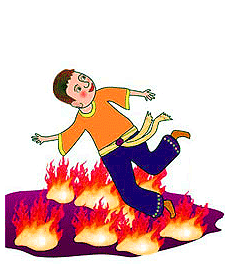 In ancient times, there was a compassionate prince called Tanmoqian. He had a strong resolve to practice good deeds and learn the Buddha’s teachings, so he sent people to search for virtuous teachers wise in the Dharma, but all his efforts were in vain. The King of Daoli Heaven, knowing the prince’s vows and wanting to see if his faith was strong, turned himself into a mortal named Youse, and presented himself at the prince’s palace. He said that he could expound the Dharma. Hearing this, the prince was overjoyed and received his eminent guest with every sign of respect. In ancient times, there was a compassionate prince called Tanmoqian. He had a strong resolve to practice good deeds and learn the Buddha’s teachings, so he sent people to search for virtuous teachers wise in the Dharma, but all his efforts were in vain. The King of Daoli Heaven, knowing the prince’s vows and wanting to see if his faith was strong, turned himself into a mortal named Youse, and presented himself at the prince’s palace. He said that he could expound the Dharma. Hearing this, the prince was overjoyed and received his eminent guest with every sign of respect.
“My Dharma teaching is very hard to find in this mundane world, so I’m afraid you might not be willing to pay for it,” Youse glumly sighed. The prince immediately responded that he was ready to give away everything he had; he only wished to listen to the Dharma teachings and escape his afflictions. So, Youse said, “OK, then please dig a deep hole and set it on fire. After you have plunged headfirst into it as an offering to the Dharma, I can teach you.”
Without delay, the prince ordered his servants to dig a deep pit and set it alight. The king and his subjects, upon seeing the prince’s willingness to die for the sake of the Dharma, pleaded with him, saying, “Please do not imperil the country’s future! Do not sacrifice your life. We are willing to become Youse’s servants instead.” However, the prince firmly declined their offer.
The prince said, “I have been reincarnated countless times in both human and animal form. As a human I have been consumed by every kind of greed, anger, ignorance and vice. As a beast of burden I have been stung by the whip as I tottered under a heavy load. As meat I have been raised, slaughtered and eaten. And in hell I have suffered for days without end. Never before have I given anything for the Dharma. Today I can finally make an offering with this sinful body to the Dharma. This is a rare moment, and I hope that everybody can let me fulfill my aspirations to attain Buddhahood.”
Youse thereupon ascended to his Dharma seat and said, “We must be charitable at all times, keep our hearts free of hatred, and treat all sentient beings with compassion. We should cultivate a mind of joy, and rejoice at the attainment of others. And, we must liberate all beings with the Dharma, as we follow the Bodhisattva’s path.” As soon as Youse finished speaking, the prince dived into the flames. However, the burning pit in an instant turned into a placid lotus pond, and the prince found himself sitting on a large, fragrant lily pad. At that moment, the prince realized the impermanence of fortune and misfortune, and the suffering of cyclic birth and death. In order to learn the true Dharma teaching, the prince was willing to sacrifice his own life. What a fearless Bodhisattva he is!
Reflection
Most human afflictions and vexations arise from our attachment caused by false ideas and perceptions. The Dharma teaches us the truth, giving us the wisdom to clearly see the truth about reality, and enabling us to control our negative thoughts and emotions in whatever situation we find ourselves in. Being able to hear the Dharma is the greatest blessing, and being able to understand it is the greatest treasure. When we respect the Dharma and practice it, we are a step further from affliction and a step closer to true happiness. (TOP) |
Aging, Sickness and Death
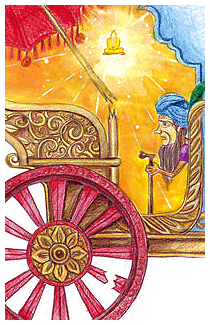 Long ago, the Buddha was at the the Jetavana Grove in Sravasti teaching the Dharma. One day, King Prasenajit sat in a quiet place and contemplated: “In this world there are three things that are to be abhorred, not to be adored, and not to be yearned for. What is to be abhorred? Aging. What is not to be adored? Sickness. What is not to be yearned for? Death.” Long ago, the Buddha was at the the Jetavana Grove in Sravasti teaching the Dharma. One day, King Prasenajit sat in a quiet place and contemplated: “In this world there are three things that are to be abhorred, not to be adored, and not to be yearned for. What is to be abhorred? Aging. What is not to be adored? Sickness. What is not to be yearned for? Death.”
After reflecting thus, King Prasenajit went to see the Buddha. After he prostrated to the Buddha, he sat on the side and asked, “The World Honored One, I was contemplating in a quiet place. In this world there are three things: The first one is to be abhorred; the second one is not to be adored; the third one is not to be yearned for. What is to be abhorred is aging. What is to not to be adored is sickness. And what is not to be yearned for is death. I beseech the Buddha to elucidate this for your disciple.”
The Buddha said, “Your understanding is uncommonly good. Just as you said, aging is to be abhorred; sickeness is not to be adored; and death is not to be yearned for. If there were no aging, sickness or death in this world, the Tathagata would not have appeared in this world to teach the Dharma. But since there are aging, sickness and death in this world, Buddha has appeared in the world to preach to all sentient beings what the Tathagata has attained and the ways to overcome these three things.”
The Buddha continued, “Your Majesty’s carriage is decorated in such a splendid way, but after much use, the colors will peel off and fade away; much like our bodies will undergo decay. But your Majesty, only the Dharma does not suffer decay with time. Even a healthy and vigorous body will deteriorate with age. Even if you live to a healthy hundred, you are still doomed to die. Sickness can strike at any time, depriving one of one’s strength. Old age means we are moving towards death. Therefore we should always practice meditation, moderate our desires and cultivate our minds diligently. We should know that where there is birth, there is death. We should aim to conquer the evil of aging, sickness and death, transcend this shore of birth and death, and reach the other shore of cool liberation.” When the Buddha had spoken the Dharma, all the bhiksus vow to joyfully follow the teaching.
Reflection
Life is short. In one moment it passes, and it’s gone. Our attachment to this impermanent body, leads to greed, anger and ignorance. We carry out many evil deeds and suffer the pain of rebirth. Trapped in the cycle of delusion, karma and suffering, we can never be free from the six paths of rebirth. Only Buddha and enlightenment is our true refuge. Therefore, we should always contemplate on the oppressive force of impermanence, and diligently practice the Dharma. We should not waste this short life on love and hate, or the pursuit of power and victory. We should use this limited life to attain the infinite life of the Buddha. (TOP) |
